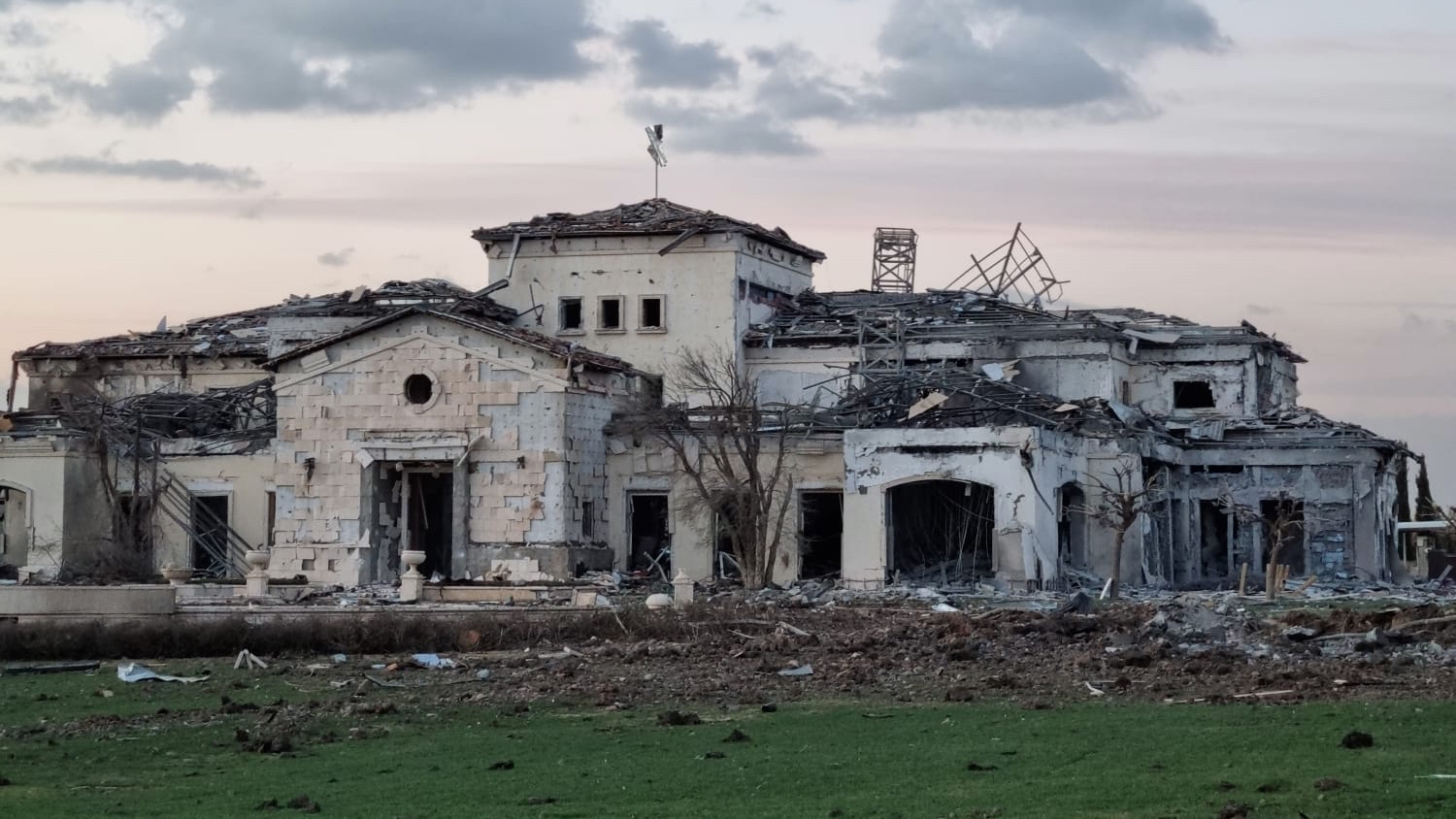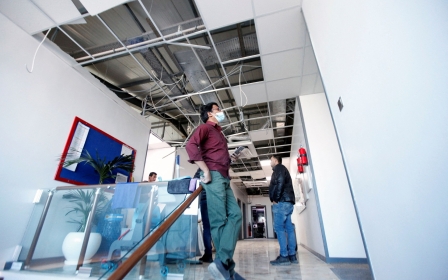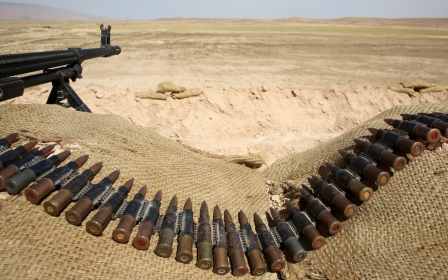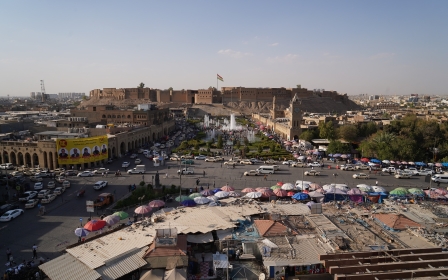Erbil missile attack: Iran's Revolutionary Guard claims responsibility

Iran’s Revolutionary Guard Corps (IRGC) on Sunday claimed responsibility for a ballistic missile attack on Erbil, the capital of Iraq’s semi-autonomous Kurdistan region, saying it was targeting an Israeli "strategic centre".
Around a dozen missiles rained down on the city at 1am on Sunday. The target initially appeared to be the US consulate's new building. Though neighbouring areas were struck, the attack seems to have only caused material damage.
The health minister in the Kurdistan Regional Government, Saman Barzanji, said there were no casualties.
Baghdad has requested via diplomatic channels a "frank and clear" explanation from Iran regarding the attack, the Iraqi government said in a statement.
Iraq "awaits a stance from the Iranian political leadership that rejects aggression," the Ministerial Council for National Security said after a meeting to discuss the attack launched from Iranian territory.
New MEE newsletter: Jerusalem Dispatch
Sign up to get the latest insights and analysis on Israel-Palestine, alongside Turkey Unpacked and other MEE newsletters
The IRGC said it had targeted a "strategic centre for conspiracy and mischiefs of the Zionists".
'Any repetition of attacks by Israel will be met with a harsh, decisive and destructive response'
- IRGC statement
Earlier this week, Iran said Israeli air strikes in Syria had killed two Revolutionary Guard officers and vowed revenge.
"Any repetition of attacks by Israel will be met with a harsh, decisive and destructive response," the IRGC said in a statement on Sepah News, the Guards' official website.
The Kurdistan Regional Council of Ministers condemned the attack, which it said was launched "under the pretext of striking an Israeli base near the US consulate in Erbil, but the target site was a civilian site, and this justification is aimed at concealing the motives of this heinous crime".
The Iranian government-affiliated Iranian Students News Agency (INSA) quoted Sabereen News, an Iranian-backed Telegram channel close to Iraqi paramilitaries, as saying “two advanced Israeli Mossad training centres" were attacked.
Erbil's governor denied the presence of Israeli units, calling such allegations "baseless", local news agency Rudaw reported.
"We condemn this terrorist attack launched against several sectors of Erbil, we call on the inhabitants to remain calm," Kurdistan Prime Minister Masrour Barzani said.
Meanwhile, US National Security Adviser Jake Sullivan said Washington was working to help Iraq get missile defence capabilities, adding that no Americans were harmed and no US facilities were hit in the attack.
"We are in consultation with the Iraqi government and the government in Iraqi Kurdistan, in part to help them get the missile defence capabilities to be able to defend themselves in their cities," Sullivan told CBS's Face the Nation programme.
'Erbil is under fire'
Kurdistan 24, a local news outlet, is based close to the new US consulate, and posted images of its damaged office after the blasts, with debris strewn across the newsroom.
Other images circulating on social media appear to show missiles striking the ground and causing explosions.
Cemal Batun, a presenter at Kurdistan 24, was in the channel's cafeteria when rockets hit nearby.
CCTV footage shows him, wearing a suit, taking cover when the rockets hit.
“Six missiles were fired and we were in the middle of broadcasting… This is a very aggressive action against a democratic people and society,” Batun told Middle East Eye.
“It's not only against a military party but against all of society, as a message that we can target you all the time. Kurdistan 24 might not be the main target, but in practice it has been one of the targets. Thank God, no one has been injured.”
Earlier on Sunday, Kurdish and US officials, speaking off the record, had suggested to media outlets that the missiles came from Iran. The Kurdish interior ministry said in a statement that the missiles were fired from outside Iraq's eastern border.
Influential Shia cleric Moqtada al-Sadr, whose political movement won the October parliamentary elections, tweeted: "Erbil is under fire… as if Kurds were not Iraqis."
A US State Department spokesperson called it an "outrageous attack".
Erbil is the site of bases that host US forces, which have routinely been targeted by Iran-backed Iraqi factions in Iraq, particularly since Washington's killing of Iranian general Qassem Soleimani at Baghdad airport in January 2020.
However, such raids appeared to have eased as political forces conducted ongoing negotiations to form a new government.
The vast majority of attacks against US forces in recent years have been launched using rockets or drones. Saturday's attack is the first to use ballistic missiles since Iran staged a retaliatory attack on US bases in Iraq days after Soleimani's killing.
Iran first used ballistic missiles in Iraq against Iranian Kurdish opposition parties in the Koya district in September 2018.
Talks on hold
The strikes come at a tense time as Iran and the US had recently appeared close to agreeing to return to the 2015 nuclear agreement, only for talks to be put on hold.
Asked about the impact on negotiations over a nuclear agreement with Iran, Sullivan said: "The various negotiators are back home in their capitals and we will have to see what happens in the days ahead with respect to the diplomacy around the nuclear deal."
He said that US President Joe Biden remained strongly committed to stopping Iran from acquiring nuclear weapons.
"One thing I will say is that the only thing more dangerous than Iran armed with ballistic missiles and advanced military capabilities is an Iran that has all of those things and a nuclear weapon," Sullivan said.
The US's recent seizure of Iranian oil cargoes and new Russian demands in the wake of Moscow's invasion of Ukraine have been cited as reasons why the talks have faltered since Friday.
Middle East Eye delivers independent and unrivalled coverage and analysis of the Middle East, North Africa and beyond. To learn more about republishing this content and the associated fees, please fill out this form. More about MEE can be found here.





